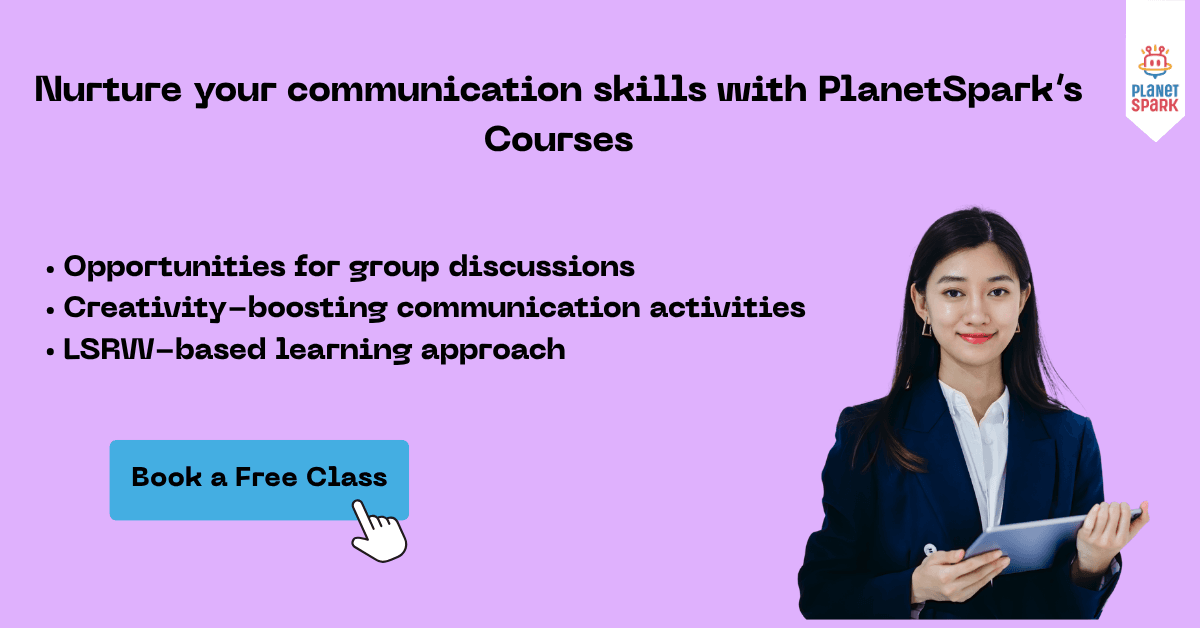Common English Phrases for Professionals: Improve Your Workplace Communication

Table of Contents
- Basic English Phrases for Everyday Professional Conversation
- Useful English Phrases for Meetings and Discussions
- Common English Phrases for Emails and Written Communication
- English Phrases for Presentations and Public Speaking
- Common English Phrases for Teamwork and Collaboration
- Common English Phrases for Client Communication
- Idiomatic Expressions and Workplace English Phrases
- Why Knowing Common English Phrases Matters at Work
- How to Choose and Use the Right English Phrases
- Mistakes to Avoid When Using Common English Phrases
- How to Practice and Remember These Phrases
- How Mastering These Phrases Boosts Career Growth
- Strengthen Your Workplace Communication with PlanetSpark’s C
- Frequently Asked Questions (FAQs)
Clear and confident communication is one of the most valuable professional skills. In today’s fast-paced and multicultural workplace, the way you use English phrases can influence how effectively you collaborate, express ideas, and build credibility. That’s why learning common English phrases for professionals is essential for anyone who wants to sound fluent, natural, and confident in meetings, emails, and everyday conversations.
This guide takes you through a wide range of common phrases in English that professionals use every day, at the office, in virtual meetings, during presentations, or while networking. You’ll not only find lists of some common phrases in English but also understand their meanings, when to use them, and how to make your communication sound more polished and engaging.
Basic English Phrases for Everyday Professional Conversations
Start by learning simple but powerful expressions used in daily interactions. These are some common phrases in English that make you sound polite and approachable.
“Good morning! How are you today?”
“Nice to meet you.”
“How’s your day going?”
“That works for me.”
“I really appreciate your help.”
“Could you please clarify that point?”
“Let me check and get back to you.”
“Thanks for your patience.”
“Sorry for the delay.”
“That sounds like a good idea.”
These most common phrases in English are easy to use but make a big difference in tone and politeness. They help create friendly and respectful workplace communication.

Useful English Phrases for Meetings and Discussions
Meetings are where professionals spend a large part of their day. Using the right common English phrases for professionals helps you express opinions, agree or disagree respectfully, and summarise decisions effectively.
Starting or leading a meeting
“Let’s get started.”
“Can we begin with a quick update?”
“Here’s what we’ll cover today.”
“Let’s review the agenda.”
“Before we dive in, does everyone have the document?”
Sharing ideas or opinions
“From my perspective…”
“I think we should consider…”
“What if we tried this approach?”
“It might be worth exploring further.”
“I completely agree with that point.”
Agreeing or disagreeing politely
“I’m on the same page.”
“That makes sense.”
“I see your point, but maybe we can also look at…”
“That’s interesting. However, another way to see it is…”
“You’re right, we need to adjust our plan.”
Wrapping up a meeting
“Let’s summarise our key takeaways.”
“We’re almost out of time.”
“Let’s touch base again next week.”
“I’ll follow up with the next steps.”
“Thanks, everyone, for your input.”
These expressions not only help you sound professional but also make conversations structured and clear.
Ready to take your communication to the next level?
Common English Phrases for Emails and Written Communication
Writing professional emails is an essential workplace skill. The following are commonly used English phrases for clear and courteous communication:
Opening lines
“I hope this email finds you well.”
“Thank you for reaching out.”
“I wanted to follow up on our previous discussion.”
“As per our conversation…”
“I’m writing to inform you about…”
Requesting information
“Could you please provide an update on…”
“I would appreciate it if you could share…”
“Would you mind confirming…”
“Please let me know if this works for you.”
“Kindly send across the final version.”
Sharing updates or attachments
“Please find attached the report.”
“I’ve attached the file for your reference.”
“Here’s the latest update from our team.”
“As discussed, I’ve included the revised proposal.”
“Attached is the summary of today’s meeting.”
Closing lines
“Looking forward to your response.”
“Please let me know your thoughts.”
“Happy to discuss this further.”
“Thanks for your time and support.”
“Have a great day ahead!”
Using these common phrases in English ensures your emails sound polished, polite, and professional.
Don’t just learn phrases, master real communication.
English Phrases for Presentations and Public Speaking
When delivering a presentation, your goal is to sound confident and organised. Here are some common phrases in English used in presentations:
Introducing your topic
“Good morning, everyone. Today I’ll be talking about…”
“Let’s begin by looking at…”
“The purpose of this presentation is to…”
Transitioning between points
“Moving on to the next point…”
“Now let’s take a closer look at…”
“That brings us to our next topic.”
Explaining visuals or data
“As you can see from this chart…”
“This slide shows that…”
“The data clearly indicates…”
Concluding
“To sum up…”
“In conclusion…”
“That’s all from my side. Thank you for listening.”
These phrases help maintain flow and give your presentation a professional tone.
Common English Phrases for Teamwork and Collaboration
Team communication often requires friendly yet clear language. These commonly used English phrases can help you collaborate effectively:
“Let’s work together on this.”
“Can you take the lead on this task?”
“We’re on the same page.”
“Let’s brainstorm some ideas.”
“Do you have any feedback on this?”
“I’ll handle this part; you can take care of the next.”
“That’s a great suggestion, let’s implement it.”
“We need to iron out the details before finalising.”
Such teamwork-oriented expressions make collaboration smoother and more productive.
Common English Phrases for Client Communication
When talking to clients, professionalism and courtesy are crucial. Here are most common phrases in English used in client conversations:
“Thank you for your patience.”
“We really appreciate your feedback.”
“I completely understand your concern.”
“We’re working to resolve this as soon as possible.”
“Please rest assured, we’re on it.”
“I’ll get back to you with an update shortly.”
“Thank you for bringing this to our attention.”
“We value your business and look forward to serving you again.”
Using polite and empathetic language helps maintain good client relationships and builds trust.
Speak confidently in meetings and interviews.
Idiomatic Expressions and Workplace English Phrases
Idioms make your English sound natural and fluent. Below are some common phrases in English that are idiomatic but widely understood in professional settings:
“Get the ball rolling” – Start something new
“Ahead of the curve” – Be innovative or proactive
“Too much on my plate” – Have too many tasks
“Think outside the box” – Be creative
“Call it a day” – End work for the day
“Touch base” – Get in contact briefly
“Back to the drawing board” – Restart after a failure
“On the same page” – Agree on something
Using idioms occasionally shows language fluency but avoid overusing them, especially in formal writing.
Why Knowing Common English Phrases Matters at Work
Professionals often communicate across cultures, time zones, and teams. In such diverse environments, using familiar and universal phrases helps avoid misunderstandings. For example, saying “Let’s touch base next week” or “I’ll get back to you soon” is far more natural and efficient than long, formal explanations.
Using common English phrases for professionals builds:
Clarity – People understand your intention immediately.
Confidence – You sound prepared and fluent.
Connection – Colleagues feel more comfortable speaking with you.
Professionalism – You fit naturally into workplace communication patterns.
Mastering commonly used English phrases helps you save time, sound authentic, and make communication smoother—whether you’re talking to your boss, clients, or teammates.
How to Choose and Use the Right English Phrases
Every situation requires a different tone and choice of words. Using the wrong expression can sometimes make you sound too casual or overly formal. Follow these tips to select and apply common phrases in English effectively:
1. Match phrases to context
Think about where you’ll use the phrase, emails, meetings, or informal chats. For instance:
Email: “I wanted to follow up on…” or “Please find attached…”
Meeting: “Let’s move forward with this idea.” or “Can we revisit this later?”
Conversation: “How’s everything going?” or “That sounds great.”
2. Understand meanings and tone
Some phrases are idiomatic and don’t translate literally. “Get the ball rolling” doesn’t mean a physical ball—it means starting something. Understanding this helps you use phrases correctly and avoid confusion.
3. Use naturally, not mechanically
Instead of stuffing phrases into every line, use them where they genuinely fit. For example, “Let’s wrap up this discussion” sounds natural, while “Let’s touch base regarding everything” can feel forced.
4. Combine with your personal style
Add your tone and authenticity to every conversation. You can say, “Let’s touch base tomorrow. I’ll share a summary before then.” You’re combining commonly used English phrases with your own natural speech.
Mistakes to Avoid When Using Common English Phrases
Even fluent speakers sometimes make mistakes with professional phrases. Keep these tips in mind:
Don’t overuse buzzwords – Phrases like “synergy” or “paradigm shift” may sound forced. Use simple, clear language instead.
Avoid literal translations – Not every phrase translates well across languages. Learn meanings through examples.
Match tone to situation – Phrases suitable for casual talk might not fit formal reports.
Don’t imitate blindly – Some phrases are trendy but not necessary. Always focus on clarity.
By avoiding these mistakes, your use of common English phrases for professionals will feel natural and appropriate.
Make your words count at work.
How to Practice and Remember These Phrases
Learning phrases is only effective when you practice them regularly. Here’s how you can retain and apply them:
Make your own phrase list
Write down 10 new commonly used English phrases each week. Next to each, add one example sentence that suits your job role.
Use them in real conversations
Apply at least one new phrase each day in your meetings or emails. Gradual use improves recall.
Listen and observe
Watch English interviews, business podcasts, or workplace communication videos. Notice how speakers use most common phrases in English in context.
Practice speaking aloud
Record yourself using these expressions or have a conversation partner. The more you speak them, the more naturally they’ll come to you.
How Mastering These Phrases Boosts Career Growth
Strong communication is one of the top skills employers look for. When you know the right words and phrases to use, you:
Present ideas more effectively
Build rapport faster with colleagues and clients
Navigate cultural differences smoothly
Increase chances of promotion or leadership roles
Learning common English phrases for professionals isn’t just about language, it’s about unlocking confidence, clarity, and influence.
Becoming fluent in workplace English takes consistent effort, but every small step counts. Start by learning some common phrases in English, use them regularly, and build from there. Over time, these expressions will become a natural part of your professional communication.
To recap:
Learn the meaning and context of each phrase.
Practice regularly in emails, meetings, and calls.
Focus on clarity and tone rather than complexity.
Avoid overusing corporate jargon.
With the right approach, these commonly used English phrases will make your conversations smoother, your writing sharper, and your communication more effective. Whether you’re attending meetings, presenting to clients, or managing a team, these expressions will help you sound confident and credible in every interaction.
Mastering common English phrases for professionals is not just about language learning, it’s about building a skill that opens doors in your career and connects you with people worldwide.

Strengthen Your Workplace Communication with PlanetSpark’s Communication Skills Course
If you’ve learned about common English phrases for professionals and want to take your communication to the next level, PlanetSpark’s Communication Skills Course is the perfect next step. It combines expert guidance, AI-enabled tools, and interactive practice to help learners build clarity, confidence, and fluency in professional English.
What Makes PlanetSpark’s Communication Skills Course Unique
1:1 Personal Trainers
Every learner is paired with a certified communication expert who offers individual attention and feedback. Trainers understand each student’s learning pace, personality, and strengths, ensuring every session is productive and engaging.Personalized Curriculum
Learning begins with an assessment that identifies gaps in fluency, pronunciation, and grammar. Based on this, a customized roadmap is created to strengthen both spoken and written communication, from basic workplace phrases to confident public speaking.AI-Enabled Practice and Progress Tracking
With PlanetSpark’s SparkX tool, learners record and review their communication performances. The AI analyses speech clarity, tone, confidence, and structure, giving precise feedback for improvement. Regular reports track measurable progress over time.Real-World Practice and Role Plays
Learners engage in simulated conversations such as interviews, meetings, and client calls. This hands-on approach ensures you can apply common phrases in English and professional vocabulary naturally in real-life scenarios.Gamified Learning Experience
Interactive tools and challenges make learning enjoyable and motivating. You’ll find quizzes, speaking prompts, and listening exercises designed to keep your learning consistent and fun.Regular Progress Reports and Feedback
Trainers provide structured reports highlighting your growth in fluency, pronunciation, and confidence. This ensures you always know where you stand and what to focus on next.
With PlanetSpark, learning communication isn’t limited to grammar or vocabulary, it’s about mastering the art of speaking with clarity, expressing ideas effectively, and using the right common English phrases for professionals to make a lasting impression.
Readers Also Read:
Frequently Asked Questions (FAQs)
1. Why should professionals learn common English phrases?
Knowing common English phrases for professionals helps you communicate clearly and confidently in the workplace. It improves your ability to express ideas, participate in meetings, and build better relationships with colleagues and clients.
2. Are these phrases useful for both written and spoken communication?
Yes. Many common phrases in English can be used in both contexts—like “I’ll get back to you soon” (emails) or “Let’s touch base next week” (meetings). The key is to match the tone and formality to the situation.
3. How can I remember and use these phrases naturally?
Practice them regularly in real conversations. Try to use one or two new commonly used English phrases each day in emails, discussions, or calls. The more you use them, the more naturally they’ll come to you.
4. What are the most common mistakes professionals make while using these phrases?
Overusing buzzwords or using phrases out of context. For example, saying “Let’s touch base” in a formal document may sound too casual. Always be mindful of tone, audience, and relevance.
5. How can PlanetSpark help me improve my communication skills?
PlanetSpark’s Communication Skills Course offers personalized 1:1 coaching, AI-enabled practice tools, and real-world role plays that help professionals master English fluency and workplace communication. It’s a complete learning experience designed for measurable progress.
6. Is the PlanetSpark course suitable for working professionals?
Absolutely. The sessions are flexible, interactive, and tailored for adults who want to improve their confidence, pronunciation, and command of business English. You can book a free demo to see how it works.
7. What kind of results can I expect after joining?
Most learners notice improvement in their speaking clarity, professional vocabulary, and ability to handle presentations or client meetings more confidently within a few weeks of consistent practice.
Personalized Communication Report
Record a video to get a AI generated personalized communication report for your child

Hi There, want to try these
tips for your child with
LIVE with our expert coach?
Let's check your child's
English fluency
